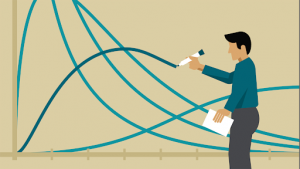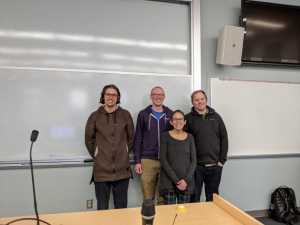Welcome from the Chair

Our own Statistics building has a rich history, and once served as a makeshift hospital for victims of the 1918 flu; see historic photos of the third floor in this recent SOURCE article.
Now, over 100 years later, another global pandemic has arrived to remind us of the need for good data, careful analysis, and decision-making under uncertainty! Sadly, we were not able to celebrate in person with our graduates this spring. No handshakes for our undergraduates crossing the stage, no taco bar on the lawn for our MAS graduates, and no hooding of new PhDs.
But all the evidence from our past and our current response indicates we will be back, and better than ever. Our entire operation—all classes, Statistics Success Center tutoring, Stat Lab consultations, and graduate student research and mentoring—moved online in just over one week: a testament to the resilience of our students and faculty.
Despite the pandemic challenge, we have good news to report. This spring, we hired two assistant professors. Matt Koslovsky, a Biostatistics PhD from the University of Texas Health Science Center, is currently a post-doc at Rice University. Matt works on analysis of behavioral health using data from wearable devices. Tianjian Zhou, a Statistics PhD from the University of Texas at Austin, is currently a post-doc at the University of Chicago. Tianjian works on adaptive clinical trial designs. You will hear more about Matt and Tianjian after they join us in the fall.
One other piece of good news: I am excited to announce that Dean Jan Nerger has appointed Haonan Wang as the next Chair of the Department of Statistics. You will hear more about Haonan in coming months, but the quick summary is that he is an outstanding scholar with proven dedication to all aspects of the department’s mission.
Please have a look at this newsletter to see more good news about innovative classes and activities, dedicated faculty, and award-winning students. We hope that you and your families are healthy, and we wish you all the best!
F. Jay Breidt, Interim Chair
Department News
Congratulations to the Spring Class of 2020

The Department of Statistics would like to extend our sincere congratulations to the Spring Class of 2020! We wish to recognize the culmination of your hard work and efforts. While the ceremony has been postponed, we celebrate your success and wish you all the best.
Statistics Book Club

Statistics Instructor and Advisor Ben Prytherch started the CSU Statistics Book Club in January 2019! Members of the club read and discuss interesting topics from the world of data analysis and statistics that might not be emphasized in a statistics class. The club is attended by people from a wide variety of backgrounds: undergraduate and graduate students, faculty from many different departments (including Statistics, Psychology, Philosophy, and Mathematics), and members of the public who are not officially affiliated with CSU. The first book they read was Deborah Mayo’s “Statistical Inference as Severe Testing”. In fall 2019, the club read Alex Reinhart’s “Statistics Done Wrong: The Woefully Complete Guide”. For spring 2020, they are reading Judea Pearl’s “The Book of Why”. Book club members have found the discussions engaging and interesting outside of the classroom.
Updates on Undergraduate Statistics Curriculum

As part of the new undergraduate Data Science curriculum, the Department of Statistics is offering two new courses in Data Science this spring: Inferential Reasoning in Data Analysis (DSCI 335) and Data Graphics and Visualization (DSCI 336). Students in the inferential reasoning course read published manuscripts, write responses, and engage in group discussions in the classroom and online.
Topics include deductive vs. inductive reasoning, interpretations of popular statistical summaries, Frequentist and Bayesian interpretations of probability, how modeling assumptions inform inference, distinguishing between confounding and interaction, ethical concerns in data analysis, and the controversies surrounding statistical significance, publication bias, replicability of research, and how the statistics community communicates with the scientific community.
Topics in the data graphics and visualization course include basics of data visualization, ggplot’s grammar of graphics, graphics for various data types, and visualization of geographical data using maps.
In addition to these two courses, we have developed a new one-credit course, STAT 302, that allows students who have taken General Statistics (STAT201) to obtain STAT301-equivalent training without starting over. A new online version of STAT 201 is also being developed. STAT 331 is another new intermediate statistics course. This course primarily serves students who are not pursuing a statistics degree but who want a deeper understanding of popular methods than what they get from an introductory level course.
Grant for development new R curriculum

Senior Instructor and undergraduate advisor Ben Prytherch and Matt Ross (a professor in Ecosystem Science and Sustainability) were awarded funding from CSU’s Digital Learning Initiative to develop online one-credit undergraduate-level R courses. A Statistics PhD student, Alex Fout, will be developing these courses this summer. A variety of departments and colleges at CSU now teach courses that use R but have no formal R prerequisite. R training had previously been incorporated into those courses, and students have struggled to learn R at the same time as the core content of the course. The new courses will centralize R training, be accessible and flexible, and allow faculty to spend more time in class teaching core material and less time teaching R.
CSU Students Win First Prize at CIDA Hackathon
Four Department of Statistics students took home first prize at the 2020 Center for Innovative Design & Analysis (CIDA) Hackathon! The Hackathon was put on by the Colorado School of Public Health and involved hands-on analyses of wearable data. Teams began coding on a Friday at 5pm and continued through Saturday at 3pm when presentations were sent to the judging panel. The CSU team, called the B-team, took home first prize in the data science event. The team members were Alex Fout (graduate), Mantautas Rimkus (graduate), Claudia Santillan-Lensink (undergraduate), and Mark Gardner (undergraduate). Great job, team!
Faculty Spotlight
Jana Anderson

Dr. Jana Anderson is the Director and Advisor for the Master of Applied Statistics (MAS) and Statistics Online Learning programs. She also manages and advises the certificate programs in the department. Jana has worked at CSU in various capacities since 1986. She earned her PhD in Statistics from Colorado State University and was recently promoted to Professor in the Department of Statistics. Jana connects with students from all over the world and is invested in student success in applied statistics. She is constantly involved in modernizing the MAS and applied statistics courses. The thriving applied master’s degree program with 20-30 graduates per year is a testament to the impact of her work. Jana’s favorite part of working at CSU is the people – all of her students, both local and online, as well as the great contacts within and outside of the department. Outside of work, Jana enjoys cycling with her husband, knitting and playing bluegrass and folk music on the mandolin.
ARCHIVED NEWSLETTERS
Welcome to the Department of Statistics’ Newsletter collection! We hope that this page will become a living record of the achievements, milestones, awards, honors and other news from our outstanding students, faculty and staff. Enjoy!
Send your Statistics news, events, and story ideas to stats@stat.colostate.edu


